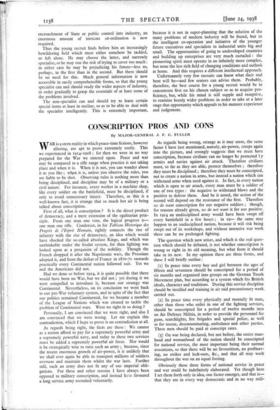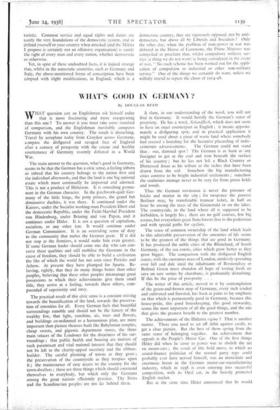CONSCRIPTION PROS AND CONS
By MAJOR-GENERAL J. F. C. FULLER
WAR is a stern reality in which peace-time fictions, however alluring, are apt to prove extremely costly. This we experienced in 1914-1918 ; for then we were in no way prepared for the War we entered upon. Peace and war may be compared to a rifle range when practice is not taking place and when it is. When it is not, you can wander about it as you like ; when it is, unless you observe the rules, you are liable to be shot. Observing rules is nothing more than being disciplined, and discipline may be of a military or a civil nature. For instance, every worker in a machine shop, like every soldier on the battlefield, must be disciplined, if only to avoid unnecessary injury. Therefore, as this is a well-known fact, it is strange that so much hot air is being talked about conscription.
First of all, what is conscription ? It is the direct product of democracy, and a mere extension of the egalitarian prin- ciple. From one man one vote, the logical progress is— one man one rifle. Condorcet, in his Tableau Historique des Progres de l'Esprit Humain, rightly connects the rise of infantry with the rise of democracy, an idea which would have shocked the so-called absolute Kings, and which was unthinkable under the feudal system, for then fighting was looked upon as a perquisite of the nobility. Though the French dropped it after the Napoleonic wars, the Prussians adopted it, and from the defeat of France in 187o-71 onwards practically every Continental nation followed suit. Yet we and the Americans did not.
Had we done so before 1914, it is quite possible that there would have been no War, but we did not ; yet during it we were compelled to introduce it, because our strategy was Continental. Nevertheless, on its conclusion we went back to our pre-War voluntary system, and in spite of the fact that our politics remained Continental, for we became a member of the League of Nations which was created to tackle the problem of Continental wars. Were we right in so doing ?
Personally, I am convinced that we were right, and also I am convinced that we were wrong. Let me explain this contradiction, which I hope to prove is no contradiction at all.
As regards being right, the facts are these : We cannot as a nation afford to pay for a supremely powerful army and a supremely powerful navy, and today to these two services must be added a supremely powerful air force. Nor would it be strategically wise to raise such an army ; because, since the recent enormous growth of air-power, it is unlikely that we shall ever again be able to transport millions of soldiers overseas and maintain them whilst the war lasts. Further still, such an army does not fit any of our imperial obli- gations. For these and other reasons I have always been opposed to military conscription, and instead have favoured a long service army recruited voluntarily. As regards being wrong, strange as it may seem, the same factor I have just mentioned, namely, air-power, creeps again into the picture, and strongly suggests that we must have conscription, because civilians can no longer be protected L y armies and navies against air attack. Therefore civilians must, so far as they are able, protect themselves ; therefore they must be disciplined ; therefore they must be conscripted, not to create a nation in arms, but instead a nation which can withstand arms when used against it. In fact, in every nation which is open to air attack, every man must be a soldier of one of two types : the negative to withstand blows and the positive to deliver them. And be it noted, the action of the second will depend on the resistance of the first. Therefore we do want conscription for our negative soldiers ; though, for reasons already given, we do not want it for our positive. In 1914 an undisciplined army would have been swept off every battlefield in a few hours ; in 19— the same may happen to an undisciplined nation, because it will risk being swept out of its workshops, and without intensive war work there can be no prolonged fighting.
The question which now arises, and which is the real ques- tion which should be debated, is not whether conscription is wrong or right in its old meaning, but what form it should take in its new. In my opinion there are three forms, and these I will briefly outline : (r) In peace time every boy and girl between the ages of fifteen and seventeen should be conscripted for a period of six months and organised into groups on the German Youth Movement plan, but according to a system which fits British ideals, character and traditions. During this service discipline should be instilled and training in air raid precautionary work. carried out.
(2) In peace time every physically and mentally fit man, other than those who enlist in one of the fighting services, should be conscripted for a period of twelve months into an Air Defence Militia, in order to provide the personnel for guns, searchlights, fire brigades and special police, as well as for rescue, decontaminating, ambulance and other parties. These men should be paid at conscript rates.
(3) On war being declared, but not before, the entire man- hood and womanhood of the nation should be conscripted for national service, the most important being their normal avocations, so that there will be no favouritism, no profiteer- ing, no strikes and lock-outs, &c., and that all may work throughout the war on an equal footing.
Obviously these three forms of national service in peace and war could be indefinitely elaborated: Yet though here I set them forth only in idea, one factor emerges, and that is— that they are in every way democratic and in no way mill- taristic. Common service and equal rights and duties are surely the very foundations of the democratic system, and to defend yourself or your country when attacked (and the Militia I propose is certainly not an offensive organisation) is surely the right of every man and every nation, whether democratic or otherwise.
Yet, in spite of these undoubted facts, it is indeed strange that, whilst in the autocratic countries, such as Germany and Italy, the above-mentioned forms of conscription have been adopted with slight modifications, in England, which is a democratic country, they are vigorously opposed, not by anti- democrats, but above all by Liberals and Socialists ! Only the other day, when the problem of man-power in war was debated in the House of Commons, the Prime Minister was compelled to proclaim that, whilst compulsory military ser- vice (a thing we do not want) is being considered in the event of war, No such scheme has been worked out for the appli- cation of compulsion to industrial or other non-military service." One of the things we certainly do want, unless we wilfully intend to repeat the chaos of 1914-18.















































 Previous page
Previous page